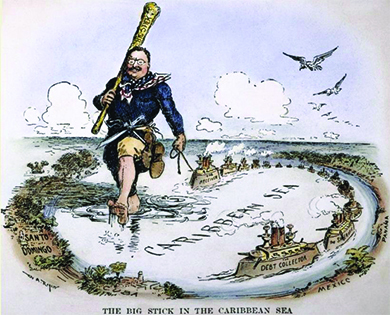| << Chapter < Page | Chapter >> Page > |
While President McKinley ushered in the era of the American empire through military strength and economic coercion, his successor, Theodore Roosevelt, established a new foreign policy approach, allegedly based on a favorite African proverb, “speak softly, and carry a big stick, and you will go far” ( [link] ). At the crux of his foreign policy was a thinly veiled threat. Roosevelt believed that in light of the country’s recent military successes, it was unnecessary to use force to achieve foreign policy goals, so long as the military could threaten force. This rationale also rested on the young president’s philosophy, which he termed the “strenuous life,” and that prized challenges overseas as opportunities to instill American men with the resolve and vigor they allegedly had once acquired in the Trans-Mississippi West.

Roosevelt believed that while the coercive power wielded by the United States could be harmful in the wrong hands, the Western Hemisphere’s best interests were also the best interests of the United States. He felt, in short, that the United States had the right and the obligation to be the policeman of the hemisphere. This belief, and his strategy of “speaking softly and carrying a big stick,” shaped much of Roosevelt’s foreign policy.
As early as the mid-sixteenth century, interest in a canal across the Central American isthmus began to take root, primarily out of trade interests. The subsequent discovery of gold in California in 1848 further spurred interest in connecting the Atlantic and Pacific Oceans, and led to the construction of the Panama Railway, which began operations in 1855. Several attempts by France to construct a canal between 1881 and 1894 failed due to a combination of financial crises and health hazards, including malaria and yellow fever , which led to the deaths of thousands of French workers.
Upon becoming president in 1901, Roosevelt was determined to succeed where others had failed. Following the advice that Mahan set forth in his book The Influence of Seapower upon History , he sought to achieve the construction of a canal across Central America, primarily for military reasons associated with empire, but also for international trade considerations. The most strategic point for the construction was across the fifty-mile isthmus of Panama, which, at the turn of the century, was part of the nation of Colombia. Roosevelt negotiated with the government of Colombia, sometimes threatening to take the project away and build through Nicaragua, until Colombia agreed to a treaty that would grant the United States a lease on the land across Panama in exchange for a payment of $10 million and an additional $250,000 annual rental fee. The matter was far from settled, however. The Colombian people were outraged over the loss of their land to the United States, and saw the payment as far too low. Influenced by the public outcry, the Colombian Senate rejected the treaty and informed Roosevelt there would be no canal.

Notification Switch
Would you like to follow the 'U.s. history' conversation and receive update notifications?